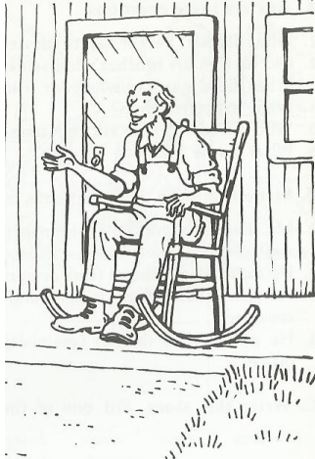
Good and bad things
 المؤلف:
L.A Hill
المؤلف:
L.A Hill
 المصدر:
Elementary Anecdotes In American English
المصدر:
Elementary Anecdotes In American English
 الجزء والصفحة:
52-1
الجزء والصفحة:
52-1
 7/10/2022
7/10/2022
 948
948

Mr. and Mrs. Wilson lived in a big crowded city, and one summer they took a vacation in the country. They enjoyed it very much, because it was a quiet, clean place and very different from the city.
One day they went for a walk early in the morning and met an old man. He lived on a farm, and he was sitting alone in the warm sun outside his front door. Mr. Wilson asked him, "Do you like living in such a quiet place?"
The old man said, "Yes, I do." Mr. Wilson said, "What are the good things about it?"
The old man answered, “Well, everybody knows everybody else. People often come and visit me, and I often go and visit them. And there are also lots of children here."
Mr. Wilson said, "That's interesting. And what are the bad things?"
The old man thought for a minute and then said, "Well, the same things, really."
A Answer these questions:
- Where did Mr. and Mrs. Wilson live?
- Where did they take their vacation?
- Why did they enjoy it?
- Who did they meet one day?
- What were the good things about living in the country?
- What were the bad things?
B Which words in the story mean the same as:
1. full of people
2. liked
3. not dirty
4. not noisy
5. not the same
6. with nobody else
C Write this story. Choose the correct word under each blank space.
Cars (do, make, put) _______ a lot of noise in the city. When you've (done, made, put) ______ your work, it (done, makes, puts) _______ you a lot of good to (do make put) _______ on your hat and coat, go out into the country and get away from the city.
Some people (do, make, put) _________ a camp in a quiet place. They (do make put) _______ their tent up, (do, make, put) _________ a fire and (do, make, put) _______ all their cooking on it. It is very important to (do, make, put) _________ a fire out before you go away. Don't (do, make, put) _______ a mistake and leave it burning, or it will start a forest fire.
 الاكثر قراءة في Elementary
الاكثر قراءة في Elementary
 اخر الاخبار
اخر الاخبار
اخبار العتبة العباسية المقدسة


